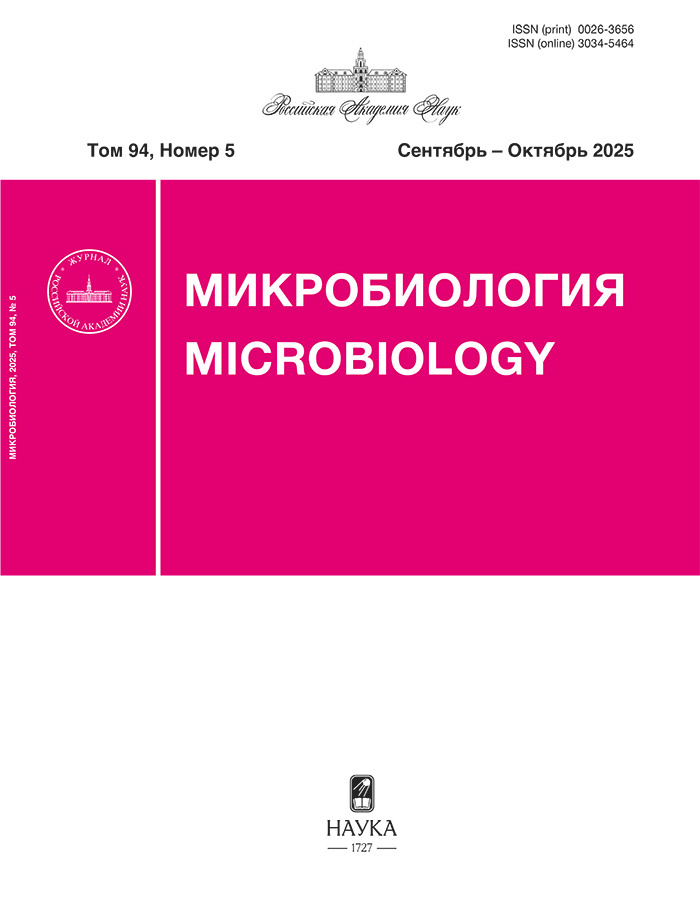Алкан монооксигеназа AlkB1 штамма Rhodococcus qingshengii X5 не обязательна для роста на алканах
- Авторы: Петриков К.В.1, Режепова А.А.1, Позднякова-Филатова И.Ю.1
-
Учреждения:
- ФИЦ ПНЦБИ РАН
- Выпуск: Том 93, № 5 (2024)
- Страницы: 651-656
- Раздел: КРАТКИЕ СООБЩЕНИЯ
- URL: https://gynecology.orscience.ru/0026-3656/article/view/655082
- DOI: https://doi.org/10.31857/S0026365624050132
- ID: 655082
Цитировать
Полный текст
Аннотация
Изучение монооксигеназных систем, отвечающих за первичное окисление алканов, необходимо для понимания бактериального метаболизма этих углеводородов. Выполненный анализ генома штамма Rhodococcus qingshengii X5 показал большое разнообразие генов, кодирующих соответствующие ферменты, в том числе 5 гомологов алкан монооксигеназ AlkB-типа. Был сконструирован штамм, дефектный по гену alkB1. Сравнение способности штамма дикого типа и мутантного штамма к росту на алканах с различной длиной цепи при двух температурах (6 и 28°C) показало сохранение базового фенотипа: хотя рост мутанта при низкой температуре был ослаблен, спектр окисляемых субстратов не изменился. Это говорит о наличии других функционирующих монооксигеназных систем, активных при разных температурах в отношении широкого спектра алканов.
Ключевые слова
Полный текст
Об авторах
К. В. Петриков
ФИЦ ПНЦБИ РАН
Автор, ответственный за переписку.
Email: petrikov_kv@pbcras.ru
Институт биохимии и физиологии микроорганизмов им. Г.К. Скрябина РАН
Россия, 142290, ПущиноА. А. Режепова
ФИЦ ПНЦБИ РАН
Email: petrikov_kv@pbcras.ru
Институт биохимии и физиологии микроорганизмов им. Г.К. Скрябина РАН
Россия, 142290, ПущиноИ. Ю. Позднякова-Филатова
ФИЦ ПНЦБИ РАН
Email: petrikov_kv@pbcras.ru
Институт биохимии и физиологии микроорганизмов им. Г.К. Скрябина РАН
Россия, 142290, ПущиноСписок литературы
- Bredholt H., Eimhjellen K. Induction and development of the oil emulsifying system in an alkane oxidizing Rhodococcus species // Can. J. Microbiol. 1999. V. 45. P. 700–708.
- Delegan Y., Valentovich L., Petrikov K., Vetrova A., Akhremchuk A., Akimov V. Complete genome sequence of Rhodococcus erythropolis X5, a psychrotrophic hydrocarbon-degrading biosurfactant-producing bacterium // Microbiol. Resour. Announc. 2019. V. 8. Art. e01234-19.
- Gibu N., Kasai D., Ikawa T., Akiyama E., Fukuda M. Characterization and transcriptional regulation of n-alkane hydroxylase gene cluster of Rhodococcus jostii RHA1 // Microorganisms. 2019. V. 7. Art. 479.
- Kim D., Choi K. Y., Yoo M., Zylstra G. J., Kim E. Biotechnological potential of Rhodococcus biodegradative pathways // J. Microbiol. Biotechnol. 2018. V. 28. P. 1037–1051.
- Kumar S., Stecher G., Li M., Knyaz C., Tamura K. MEGA X: Molecular Evolutionary Genetics Analysis across computing platforms // Mol. Biol. Evol. 2018. V. 35. P. 1547–1549.
- Kunihiro N., Haruki M., Takano K., Morikawa M., Kanaya S. Isolation and characterization of Rhodococcus sp. strains TMP2 and T12 that degrade 2,6,10,14-tetramethylpentadecane (pristane) at moderately low temperatures // J. Biotechnol. 2005. V. 115. P. 129–136.
- Ławniczak Ł., Woźniak-Karczewska M., Loibner A. P., Heipieper H. J., Chrzanowski Ł. Microbial degradation of hydrocarbons ‒ basic principles for bioremediation: a review // Molecules. 2020. V. 25. Art. 856.
- Long H., Wang Y., Chang S., Liu G., Chen T., Huo G., Zhang W., Wu X., Tai X., Sun L., Zhang B. Diversity of crude oil-degrading bacteria and alkane hydroxylase (alkB) genes from the Qinghai-Tibet Plateau // Environ. Monit. Assess. 2017. V. 189. Art. 116.
- Moreno R., Rojo F. Enzymes for aerobic degradation of alkanes in bacteria // Aerobic utilization of hydrocarbons, oils, and lipids. Handbook of hydrocarbon and lipid microbiology / Ed. F. Rojo. Springer International Publishing, 2017. P. 1–25.
- Müller C. A., Weingartner A. M., Dennig A., Ruff A. J., Gröger H., Schwaneberg U. A whole cell biocatalyst for double oxidation of cyclooctane // J. Ind. Microbiol. Biotechnol. 2016. V. 43. P. 1641–1646.
- Pérez-de-Mora A., Engel M., Schloter M. Abundance and diversity of n-alkane-degrading bacteria in a forest soil co-contaminated with hydrocarbons and metals: a molecular study on alkB homologous genes // Microbial. Ecol. 2011. V. 62. P. 959–972.
- Petrikov K., Delegan Y., Surin A., Ponamoreva O., Puntus I., Filonov A., Boronin A. Glycolipids of Pseudomonas and Rhodococcus oil-degrading bacteria used in bioremediation preparations: formation and structure // Proc. Biochem. 2013. V. 48. P. 931–935.
- Rojo F. Degradation of alkanes by bacteria // Environ. Microbiol. 2009. V. 11. P. 2477–2490.
- Sambrook J., Russell D. W. Molecular cloning: a laboratory manual. Cold Spring Harbor Laboratory Press, 2001.
- Schulz S., Giebler J., Chatzinotas A., Wick L. Y., Fetzer I., Welzl G., Harms H., Schloter M. Plant litter and soil type drive abundance, activity and community structure of alkB harbouring microbes in different soil compartments // ISME J. 2012. V. 6. P. 1763–1774.
- Smith C. B., Tolar B. B., Hollibaugh J. T., King G. M. Alkane hydroxylase gene (alkB) phylotype composition and diversity in northern Gulf of Mexico bacterioplankton // Front. Microbiol. 2013. V. 4. Art. 730.
- Sokolovska I., Rozenberg R., Riez C., Rouxhet P. G., Agathos S. N., Wattiau P. Carbon source-induced modifications in the mycolic acid content and cell wall permeability of Rhodococcus erythropolis E1 // Appl. Environ. Microbiol. 2003. V. 69. P. 7019–7027.
- Takei D., Washio K., Morikawa M. Identification of alkane hydroxylase genes in Rhodococcus sp. strain TMP2 that degrades a branched alkane // Biotechnol. Lett. 2008. V. 30. P. 1447–1452.
- Tomasino M., Aparício M., Ribeiro I., Santos F., Caetano M., Almeida C., de Fátima Carvalho M., Mucha A. Diversity and hydrocarbon-degrading potential of deep-sea microbial community from the Mid-Atlantic Ridge, south of the Azores (North Atlantic Ocean) // Microorganisms. 2021. V. 9. Art. 2389.
- Tsai Y.-F., Luo W.-I., Chang J.-L., Chang C.-W., Chuang H.-C., Ramu R., Wei G.-T., Zen J.-M., Yu S. S.-F. Electrochemical hydroxylation of C3–C12 n-alkanes by recombinant alkane hydroxylase (AlkB) and rubredoxin-2 (AlkG) from Pseudomonas putida GPo1 // Sci. Rep. 2017. V. 7. Art. 8369.
- van Beilen J. B., Funhoff E. G. Alkane hydroxylases involved in microbial alkane degradation // Appl. Microbiol. Biotechnol. 2007. V. 74. P. 13–21.
- van Beilen J. B., Smits T. H.M., Whyte L. G., Schorcht S., Röthlisberger M., Plaggemeier T., Engesser K.-H., Withol B. Alkane hydroxylase homologues in Gram-positive strains // Environ. Microbiol. 2002. V. 4. P. 676–682.
- Whyte L. G., Smits T. H.M., Labbé D., Witholt B., Greer C. W., van Beilen J. B. Gene cloning and characterization of multiple alkane hydroxylase systems in Rhodococcus strains Q15 and NRRL B-16531 // Appl. Environ. Microbiol. 2002. V. 68. P. 5933–5942.
- Wiesenberg G. L.B., Lehndorff E., Schwark L. Thermal degradation of rye and maize straw: Lipid pattern changes as a function of temperature // Org. Geochem. 2009. V. 40. P. 167–174.
- Xia Y., Li K., Li J., Wang T., Gu L., Xun L. T5 exonuclease-dependent assembly offers a low-cost method for efficient cloning and site-directed mutagenesis // Nucl. Acids Res. 2019. V. 47. P. e15.
- Xiang W., Liang Y., Hong S., Wang G., You J., Xue Y., Ma Y. Degradation of long-chain n-alkanes by a novel thermal-tolerant Rhodococcus strain // Arch. Microbiol. 2022. V. 204. Art. 259.
- Zampolli J., Collina E., Lasagni M., Di Gennaro P. Biodegradation of variable-chain-length n-alkanes in Rhodococcus opacus R7 and the involvement of an alkane hydroxylase system in the metabolism // AMB Express. 2014. V. 4. Art. 73.
Дополнительные файлы









